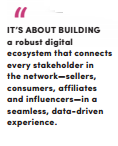Social commerce promotes an environment of community building, trust and credibility
THE INTERSECTION of direct selling and social selling has emerged as a powerhouse in reshaping how direct sellers engage with consumers. The merging of commerce and social media is a direct response to changing consumer behavior known as social shopping. Fueling these behaviors, on average people are spending over 2.5 hours per day scrolling through their favorite social media sites with an estimated 4.9 billion people on social media platforms. With most direct sellers leveraging social media, every interaction on social platforms like TikTok, Facebook, Instagram, YouTube and WhatsApp present potential revenue generating opportunities.
We are witnessing an extraordinary transformation, fueled by advancements in direct selling centralized platforms, artificial intelligence, easy-to-use shareable media platforms and a surge in mobile connectivity. These technologies are not just tools but catalysts, creating an environment where personalized, real-time engagement with consumers isn’t just possible—it’s expected.
The Power of Digital Transformation
The heart of this new paradigm lies in digitally transforming businesses, and it’s not just doing what they should have done years ago. During the pandemic many companies were forced to reprioritize and remodel operationally, accelerating to digital solutions with more consumers moving dramatically towards online commerce.
The result is that today’s direct sellers are competing against the largest retailers and online ecommerce marketplaces that are leveraging some of the latest cutting edge social and commerce systems.

Direct sellers have been competing against the likes of Amazon and eBay for years, but the game has changed as they and thousands of other retailers are now incentivizing and rewarding consumers to socially share products.
For direct sellers, it’s about building a robust digital ecosystem that connects every stakeholder in the network—sellers, consumers, affiliates and influencers—in a seamless, data‑driven experience. People often view digital transformation as something around infrastructure and IT, and while they are absolutely necessary, it’s really about a company’s business model, go-to market strategy and understanding how direct sellers can monetize it.
With transformation there are many benefits, with key ones being the ability to generate brand-new revenue and improving and optimizing better engagement with consumers. One example of this is the latest in centralized direct selling live stream shopping solutions. There are many solutions on the market, but they operate independently. A centralized platform incorporates direct selling, social sharing, ecommerce, consumer sentiment and allows direct sellers to leverage existing tools that they are familiar with. This results in an immersive experience offering unique benefits, including:
- Building a social community of both sellers and consumers as live streaming events can be run by corporate or individual sellers.
- The ability to store live streaming events for periods of time prolonging access so consumers can watch past events and purchase from those events.
- Real-time purchasing within the event creates a shorter journey with instant checkout without having to download an app or being redirected to another platform to purchase.
- Collecting “first-party data” so customer metrics, tracking purchases and attendee sentiments can all be used for more personalized and relevant future experiences.
Moreover, centralized digital platforms facilitate a unified view of the consumer journey, helping direct sellers streamline their strategies across various channels. This omnichannel approach ensures a consistent and cohesive brand message, which is crucial in building trust and loyalty among consumers. Through digital transformation and leveraging centralized platforms, businesses can create a more targeted and dynamic marketing strategy that adapts to the changing preferences and behaviors of their sellers and consumers.
Dynamic Compensation Engine: Innovating Reward Strategies

A pivotal element in the future of direct and social selling is having a flexible compensation system. These systems enable businesses to rapidly launch new compensation programs, incentives and social sharing rewards without the need for writing custom code. This innovation marks a significant shift in how direct sellers can motivate and retain their sellers, preferred consumers, affiliates and influencers.
Most retailers and online marketplaces offering affiliate-type programs have limited compensation and reward platforms that are not flexible. By utilizing sophisticated compensation engines, direct sellers have a competitive advantage and can easily adapt, model and update their compensation, incentive and reward programs to support individual performance, social sharing, team selling, event selling and business goals.
The introduction of these advanced compensation engines is revolutionizing the way direct selling organizations operate, making them more efficient, more social and more adaptable—capable of sustaining a motivated and high-performing sales force, affiliate and consumer base. This development is crucial in maintaining a competitive edge in the rapidly evolving digital marketplace.
Social Commerce: Enhancing Engagement Across All Marketing Channels
Understanding the significance of segmenting different stakeholders such as consumers, affiliates, referrals, influencers and sellers is essential for crafting effective sales strategies. Each group plays a vital role in the ecosystem of direct and social selling as well as their unique characteristics and needs.
Advanced software solutions enable companies to segment their network. This powerful technique allows for targeted messaging campaigns, ensuring consumers receive relevant information and offers. Concurrently, sellers can share the most relevant media and stay informed about promotions, incentives and training tailored to their needs, leading to a more effective and fulfilling experience for all.
For consumers, who are the end-users of software products, the focus should be on user‑friendly interfaces and functionalities that directly address their specific needs. Referrals and influencers may not directly be involved in selling but are crucial for building brand awareness and credibility. They need software tools that facilitate easy sharing and tracking of referral leads or campaign performances.
Sellers, the frontline warriors in the sales process, need tools that not only help them understand the product intricately but also assist in demonstrating its value to potential consumers. Their software should include advanced sales enablement features with instant sales and team reporting.
By effectively segmenting these key groups and understanding their journey, chances are greater that your consumer will make a purchase; become a repeat consumer; and share those experiences with their friends and family. Your seller will also be more engaged and satisfied, and you will retain them longer. Ultimately, such a segmented approach leads to more engaged consumers and organized and efficient sales operations, ensuring each group receives the specific tools and support they need to succeed.
A Glimpse into the Future
Direct selling is now living in the age of the consumer being more in control than the seller. Social media is where consumers spend most of their time looking for new trends, products and services. Direct sellers need to leverage these insights because unlike social media which thrives mainly on broadcasting ads and campaigns, social selling is modernizing relationship building and providing the personalized brand experiences that consumers want and trust.

Serving as Vice President, Global Sales at Jenkon, GREG FINK has over 30 years of experience serving in various leadership roles within direct selling. He is passionate about helping direct sales businesses and their sales force compete by leveraging new technologies and digital sales tools.


